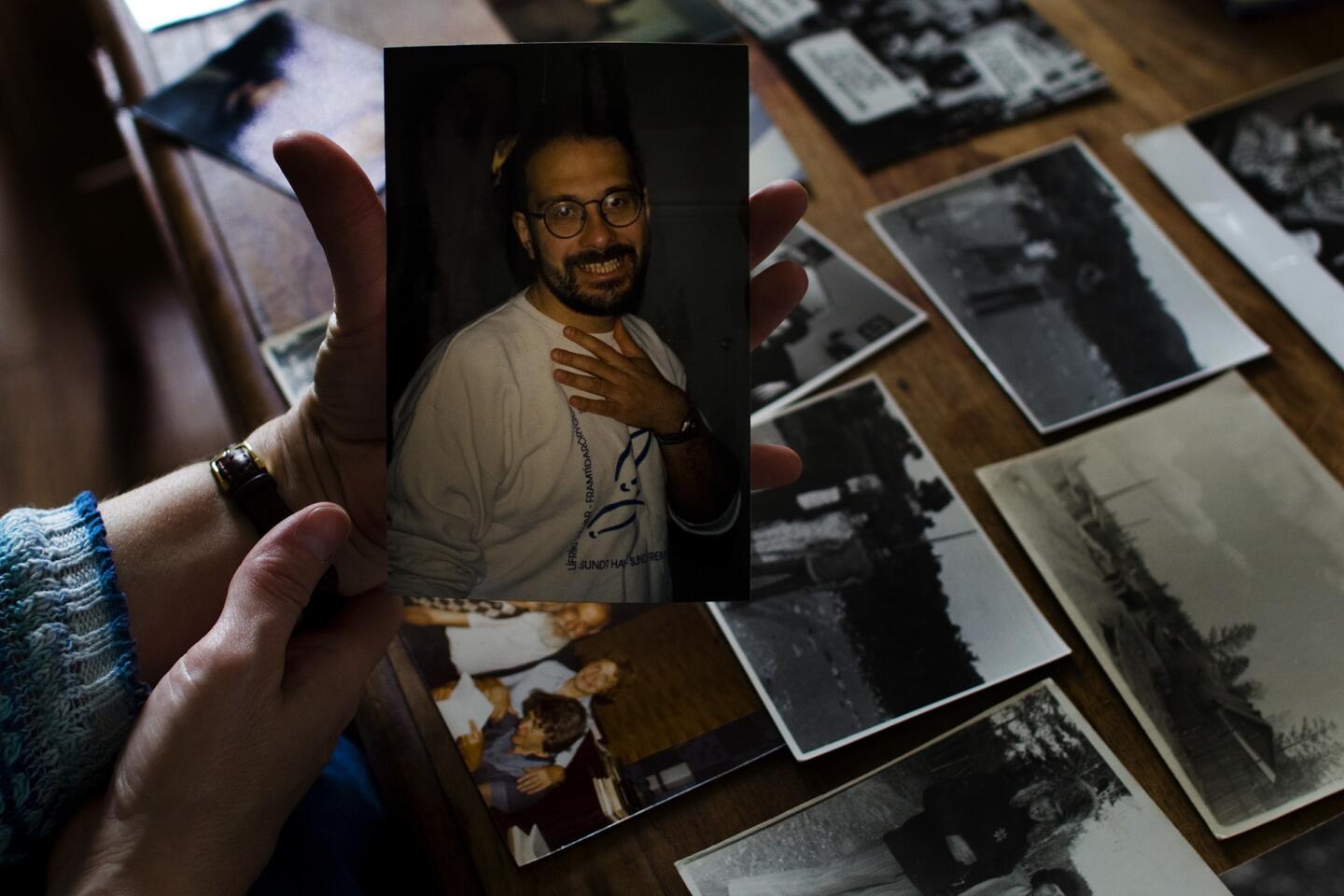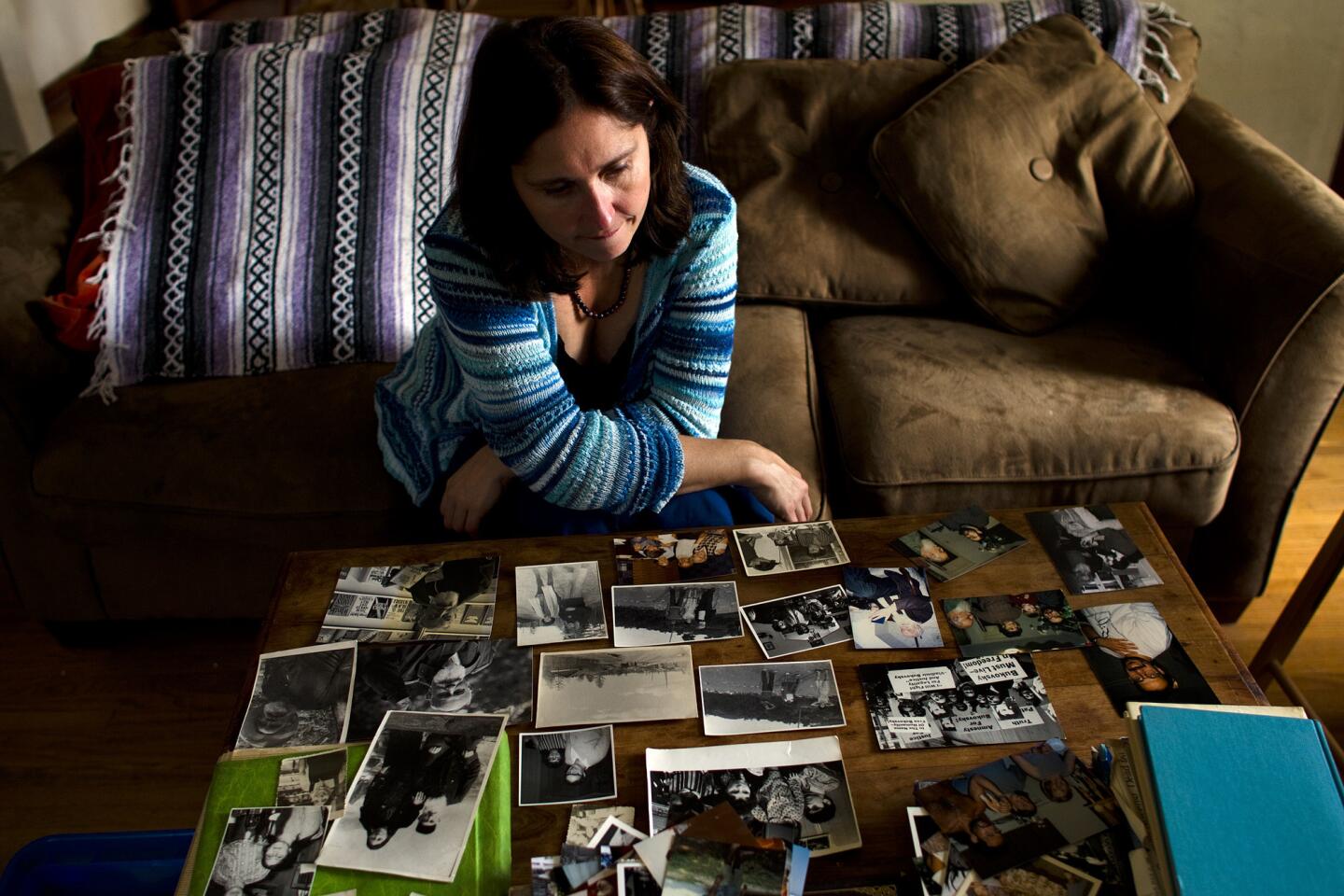As Greenpeace activist sits in Russian jail, family waits and worries
- Share via
The irony is cruel for Lara Litvinov.
Nearly half a century ago, she and her brother, Dima Litvinov — children in a family with a long history of civil disobedience — were living in exile with their parents in Siberia. When the family emigrated from the country in 1974, they believed they had left Russian oppression behind.
Now, Dima sits in a Russian jail along with the nearly 30 other Greenpeace activists for protesting oil drilling operations in the Arctic. He has become the third generation in his family to be imprisoned in Russia.
“I didn’t expect this in my life again,” said his father, Pavel Litvinov, 73, who was banished to Siberia for protesting the Soviet Union’s 1968 invasion of Czechoslovakia. “When I took Dima and Lara out of Russia, I thought I had taken them away from that country so that this could never happen.”
Dima, 51, has been a Greenpeace activist for nearly 25 years. “He wanted to make a difference in the world,” Lara said in an interview at her home in Torrance. “Money was never important to him. He was just interested in doing what is right.”
In September, Dima and other Greenpeace activists attempted to stage a demonstration against what is said to be the world’s first ice-resistant oil platform. Russian authorities acted swiftly, arresting them — and two journalists — as charges are investigated.
The family is trying to stay optimistic, but Lara is scared. She has seen photographs of her brother in handcuffs and in a courtroom, standing inside a metal cage. She hears he’s being kept in a 12- by 24-foot cell for 23 hours a day with only an hour outside. It’s cold, and it’s dark.
“There is so much that is unknown, and the Russian government is so unpredictable,” she said.
Charged first with piracy and then with hooliganism, Dima faces the possibility of years in prison with a substantial fine.
Lara thinks back to last year’s trial of the Pussy Riot defendants, punk performers imprisoned for an unauthorized concert protesting Russian leader Vladimir Putin in Moscow’s Christ the Savior Cathedral. Charged with “hooliganism motivated by religious hatred,” they lost their case and are serving a sentence of two years.
::
Dima Litvinov joined Greenpeace in the late 1980s, working as a door-to-door fundraiser on the streets of Boston. His first campaign, in the Arctic, was a protest against Russia’s testing of nuclear weapons. He was detained for nine days and eventually released by order of then-Soviet President Mikhail Gorbachev.
“He was aware of his family history but not afraid of it,” friend Steve Shallhorn said. “He felt that as a U.S. citizen he wouldn’t be at risk. Of course, he was aware of the irony of having been expelled from the Soviet Union and then coming back to protest.”
Dima has fought whaling in the Antarctic Ocean, demonstrated against bottom trawling in the north Atlantic and championed the boreal forests in Scandinavia. In 2009, he was jailed in Denmark during the Copenhagen international climate summit.
He and his wife, Anitta, and their three children live outside Stockholm. When not focused on Greenpeace’s Arctic campaign, he would exercise, cook and play “World of Warcraft.”
Anitta and Lara talk frequently and take solace in knowing that Dima, who speaks Russian, might be having an easier time adapting to prison than the other detainees. During a recent phone call — his second to Anitta since the arrest — he sounded in good spirits, but she couldn’t tell whether he was just trying to save his family from worry.
They try to track down the truth behind the rumors, one of which said Dima was being held in a punishment cell for three days for not following protocol when communicating with others outside the prison.
But little can be confirmed — including details of the Greenpeace action that led to the arrests.
Dima boarded the Arctic Sunrise, a Greenpeace icebreaker ship, in late August. Eager to preserve the Arctic, he believes that the harsh conditions of this environment would make an oil spill there impossible to contain. With the Arctic ice shield shrinking, Putin, now Russia’s president, has targeted the region for $500 billion worth of investment in offshore energy development over the next 30 years.
Sailing east, the Arctic Sunrise soon encountered the Russian coast guard. The ship had been denied permits from the Russian government to enter the Northern Sea Route, but its captain and crew maintained their right to stage peaceful protests.
On Sept. 18, the environmental group’s unique brand of street theater — activists in polar bear outfits riding bicycles on the deck, banners declaring “Greed is killing the Arctic” — took a more serious turn.
At 4 a.m. the crew lowered its inflatable boats into the near-freezing waters of the Barents Sea. They approached the Prirazlomnaya oil platform, owned by the Russian state-controlled energy company Gazprom. Touted as one of the first rigs specifically designed for drilling in the Arctic Ocean, Prirazlomnaya is scheduled to begin production by the end of the year.
Two activists climbed onto the side of the platform with the intention of hanging protest banners, but oil rig workers sprayed high-pressure fire hoses on them from above, and officers from the Russian coast guard approached in boats with knives and pistols drawn. Shots were fired into the water, and the standoff ended with the climbers taken into custody.
A Gazprom spokesman later said the activists had endangered the lives of the company’s divers, who were working underwater near the platform at the time of the protest.
The next day, the Russian coast guard stormed the Arctic Sunrise. They took custody of it and its crew — now known as the Arctic 30 — and towed the vessel to port at Murmansk.
::
Sitting in the living room of her South Bay home, Lara spreads out a dozen black-and-white photographs and points to a 1940s picture of her maternal grandfather, a distinguished young man with a confident gaze in a military uniform. He reminds her of Dima.
An antagonist of the government, Lev Kopelev was sentenced to 10 years in Moscow’s Butyrka prison for trying to keep Russian soldiers from committing atrocities against the Germans at the end of World War II.
In 1968, Dima’s father, Pavel, joined the demonstrations in Red Square to support the reform movement in Czechoslovakia. He was arrested and sent with his family to a mining town near Lake Baikal in Siberia.
In 1974, the Litvinovs immigrated to the United States. Pavel, who eventually divorced his wife, Maya, now lives in New York; she lives in Los Angeles. Kopelev continued to advocate for human rights in the Soviet Union until he was stripped of his citizenship and forced to move to Germany. He died in 1997.
Lara, 43, last saw Dima in July when he, Anitta and their two youngest children came to Los Angeles to visit Maya. As Lara speaks out for her brother, she recalls being a child and finding the family’s living room commandeered by her parents’ campaigns to free other dissidents.
Her life today feels sadly familiar.
Twitter: @tcurwen
More to Read
Sign up for Essential California
The most important California stories and recommendations in your inbox every morning.
You may occasionally receive promotional content from the Los Angeles Times.
















